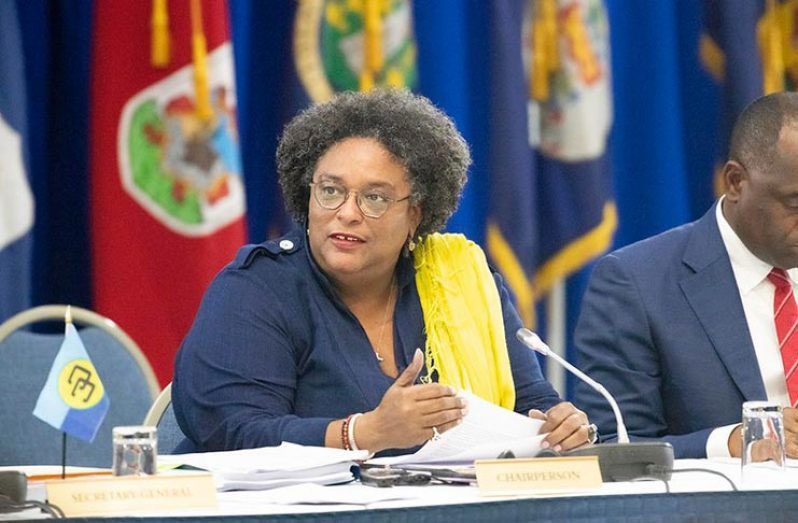–PM Mottley urges region to revisit ties with Africa, Central, Latin America & other traditional allies
–Reminds U.S. the Caribbean is its friend, not its enemy
CARIBBEAN Community (CARICOM) Chair and Prime Minister of Barbados, Mia Mottley, has reiterated the call for a renewed focus on strengthening connections with Africa, Central and Latin America, while also re-establishing long-standing relationships with traditional allies in the United Kingdom, Europe, and Canada.
In a video address posted on her Facebook page on Saturday, Mottley spoke about the impact of the United States imposition of a 10 percent baseline tariff on all imports, along with higher duties on several other countries. She emphasised the need to fortify the region’s ties with Africa, Central and Latin America, and to renew partnerships with older allies in the UK, Europe, and Canada.
“We must not rely solely on one or two markets. We need to be able to sell our Caribbean goods to a wider, more stable global market,” Mottley said.
Mottley also sent a strong message to the U.S., stating: “To the United States, I say this simply; we are not your enemy, we are your friends… We welcome your people to our shores and give them the holidays and for many of them, the experiences of a lifetime.
“I say simply to President Trump, our economies are not doing your economy any harm in any way. They are too small to have any negative or distorted impact on your country. So, I ask you to consider the decades-long friendship between your country and ours. And look to the Caribbean, recognising that the family ties, yes, are strong. Let us talk, I hope, and let us work together to keep prices down for all of our people.”
The CARICOM Chair outlined the crises currently facing the world, noting that the international system is in great danger of collapse and nations are on the precipice of a global trade war. She noted that Caribbean economies are largely reliant on imports.
“Together with colleague Heads of State and Heads of Government, we have been working to diversify ourselves away from this dependence,” she said, adding: “We’ve already started to reap some successes, especially in the field of agriculture, for example, but we still have a long way to go. As we do this work, we have to be mindful that those recent announcements that have been made in the last few days will impact us very directly as a Region and as a Caribbean people.”
Mottley said that this trade war and the possibility of a U.S. $1 million to $1.5 million levy on all Chinese-made ships entering U.S. harbours will mean higher prices at the corner shop, higher prices at the supermarkets, higher prices at the electronic store and beyond.
“A lot of Caribbean people will think that these things that you are seeing on television news or reading about are far away and ‘they don’t impact on me.’ A lot of people think, ‘I’m just a farmer,’ ‘I’m just a schoolteacher,’ or ‘I’m just a mechanic.’ They say, ‘I live in Saint Lucy in Barbados,’ or ‘I live in Portmore in Jamaica,’ or Kingstown in St Vincent, or Arima in Trinidad or Basseterre in St Kitts & Nevis, or San Ignacio in Belize’.
“…But the reality, my friends, is that if you buy food, if you buy electronics, if you buy clothes, it will impact you. It will impact each of us.”
She emphasised that Caribbean economies are relatively small, making the region vulnerable to fluctuations in global prices. Mottley pointed out that if Europe, China, the U.S., Canada, and Mexico continue imposing tariffs on each other, it will disrupt supply chains.
“We could lower our tariffs to zero in CARICOM, and it will not make a lick of difference because our economies are small and vulnerable. This crisis, my friends, will impact not only goods, but it may also have a large spillover effect on tourism.”
She called for the regional private sector and the tourism sector to come together and to work with governments to collaborate for an immediate tourism strategy.
What next?
The CARICOM Chair proposed several steps to deal with the issue. First, she called for another engagement urgently, directly, and at the highest possible level with the U.S.
“There is an obvious truth which has to be confronted by both sides. That truth is that these small and microstates of the Caribbean do not, in any way or in any sector, enjoy a greater degree of financial benefit in the balance of trade than does the United States.”
Secondly, she emphasised that there should be no conflict among each other for political gain. Thirdly, she urged for the redoubling of efforts to invest in Caribbean agricultural production and light manufacturing.
“We must grow our own and produce our own as much as possible,” Mottley said.
The Prime Minister echoed a message of unity to fellow leaders, stating: “If we come together, put any divisions aside, support our small businesses and small producers, we will come out of this stronger.”
She also urged the people to buy local and regional.



.jpg)








